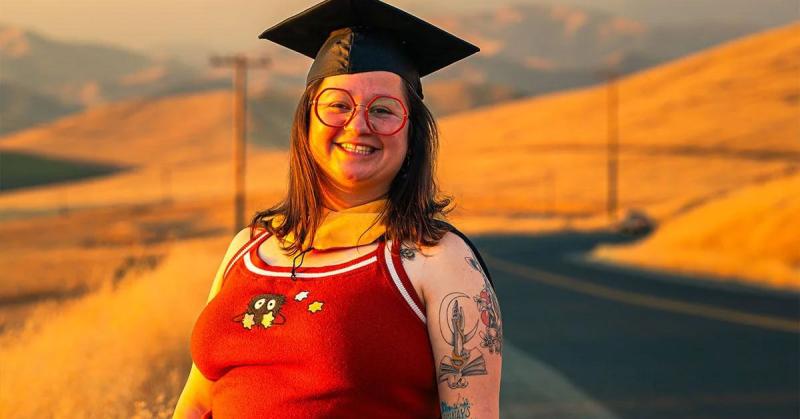Supporting Marginalized Community Members
2024 MSW graduate aims to put her degree to work helping not only victims, but offenders

As an undergraduate sociology major, new University of Denver Graduate School of Social Work (GSSW) graduate Araceli Esparza, MSW ’24, was fascinated by social problems and the social dynamics of issues such as human trafficking. That interest led her to become a community service officer with a police department, where she worked in a diversion program for first-time juvenile offenders.
In that role, she started to recognize some of the service gaps in her Tulare County, CA, community. She recalls, “There were kids I would lose. Some fell through the cracks. I was at a loss because I didn’t understand how I could help.” Esparza wanted to do more, so she began researching graduate degree options that would fit her goals to help some of her community’s most marginalized members.
With its flexibility to work at the micro, mezzo and macro levels in a wide variety of settings, social work seemed like an ideal fit. With a recommendation from her community’s chief of police, Esparza enrolled in GSSW’s MSW@Denver online MSW program, where she specialized in Mental Health & Trauma. She selected that pathway because it “would give me the ability to be a micro-level social worker and have that [human] connection, so one day when I navigate my way back to macro, I’ll remember that there are people behind the statistics.”
For the past year, Esparza has put her education to work as a victim advocate in her county district attorney’s office, where she completed a “place of employment” field internship. In her victim advocate role, she does case management, accompanies families to court, and helps victims to understand the various laws and policies involved in their cases.
Esparza says the MSW program’s emphasis on understanding power, privilege and oppression and her increased level of self-awareness have helped her to be successful in her current role. She also appreciates the deep connections she made to faculty members and other students. Despite her classmates being scattered across the United States, Esparza says they’ve become good friends and valued colleagues.
Inspired by her professors, Esparza hopes to shift her career path to see how she can contribute in other roles, such as serving as a medical social worker in a state hospital, a prison or perhaps in an inpatient substance use facility.
According to Esparza, “It is hard to make that jump to victims to offenders — I love both so much.” She notes that offenders are often a forgotten and ignored population. “I think that’s also what I enjoy so much — it keeps us balanced. Offenders often start out as victims, and we often forget that.”
She adds, “If someone I’ve interacted with in my field can have a better quality of life and I’ve somehow contributed to that, I know I’m doing my job as a social worker, whether that’s a colleague, a client or a victim. If I’ve contributed to that, that’s enough for me and gives me purpose.”




